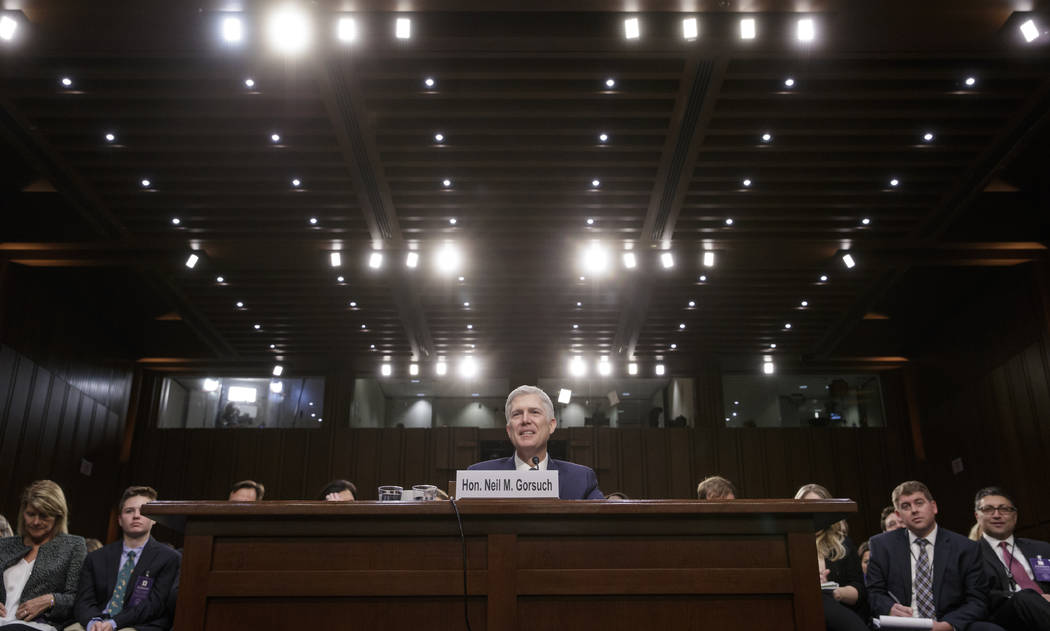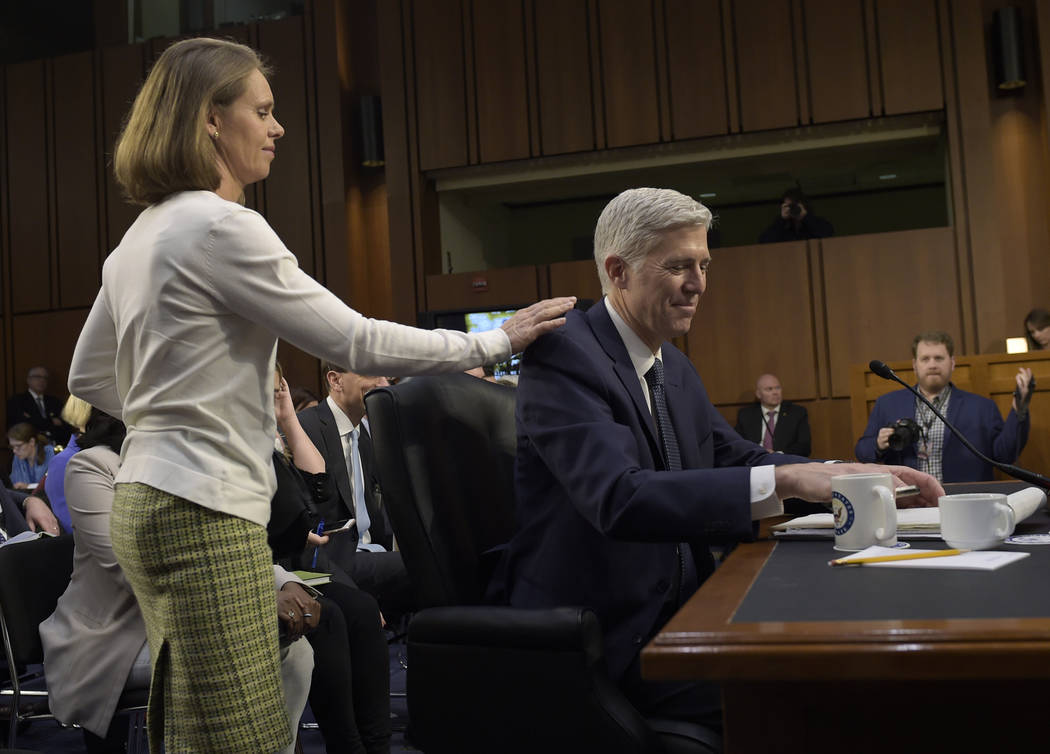Supreme Court nominee Gorsuch weathers third day of confirmation hearings
WASHINGTON — Federal Judge Neil Gorsuch, President Donald Trump’s nominee to the U.S. Supreme Court, endured his third day of confirmation hearings before the Senate Judiciary Committee Wednesday.
As on the first two days of hearings before the Senate Judiciary Committee, Republican senators gushed about Gorsuch’s judicial record on the Denver-based Court of Appeals for the Tenth Circuit, while Democrats questioned this willingness to stand up for the little guy.
Sen. Dianne Feinstein, D-Calif., pressed Gorsuch, 49, on his “orginalist” bent — a legal school of thought that believes in upholding the Constitution’s original meaning — and whether it means he would deny equal rights to women and lesbians.
Gorsuch responded that he doesn’t want to return to the “horse and buggy days,” adding that originalism requires him to look at “what the words on page mean.”
“When it comes to equal protection of the laws, for example, it matters not a whit that some of the drafters of the 14th Amendment were racists — because they were — or sexist — because they were,” he said. “The law they drafted promises equal protection of the laws for all persons. That’s what they wrote.”
Other concerns raised
Feinstein also expressed concern that Gorsuch would not respect the precedent set in the Supreme Court’s landmark Roe v. Wade abortion decision.
Other Democrats raised other cases.
Sen. Sheldon Whitehouse, D-R.I., railed against the Supreme Court’s 2010 Citizens United ruling, which said that corporations have a right to free political speech. “Public confidence has crashed since that election,” Whitehouse declared.
As the hearings began, the U.S. Supreme Court issued a 8-0 ruling on special education written by Chief Justice John Roberts saying that public schools must give students with disabilities the chance to make meaningful, “appropriately ambitious” progress. Sens. Dick Durbin, D-Ill., and Amy Klobuchar, D-Minn., challenged Gorsuch for coming to different conclusions in cases involving the Individuals with Disabilities Education Act.
Gorsuch took umbrage at the tone of the questions and the suggestion that “I like a result where an autistic child happens to lose. … The fact is, I was bound by precedent,” he said, adding that he would follow the new Roberts’ decision in the future.
Republicans on the panel, meanwhile, were glowing in their assessment of Gorsuch.
Sen. Lindsey Graham, R-S.C., marveled, “You’re getting one of the most qualified conservative judges in the country.” With a nod to Democrats, Graham added, “Sen. Feinstein, this man is as mainstream as you will get.”
“I haven’t seen anybody better than you,” agreed Sen. Orrin Hatch, R-Utah, addressing Gorsuch.
But Sen. Patrick Leahy, D-Vermont, raised the specter of federal appeals court Judge Merrick Garland, whom President Barack Obama nominated to the high court last year only to see him blocked by Senate Republicans. Leahy’s comments suggest that some Democrats who in a different year might have voted for Gorsuch are primed to oppose him.
“For the first time in the history of the United States,” Leahy said, “the Senate refused to hold a hearing, refused to have a vote.”
Timing of vote unclear
It remained unclear when — or even if — the Senate will vote on Gorsuch’s nomination if the committee approves him.
Sen. Joe Manchin, D-W.Va., entered the hearing room at one point Wednesday – encouraging those who hope a few Democrats will join Republicans to provide the 60 votes needed to reach cloture and bring a vote on the nominee to the floor. If only the Senate’s 52 Republicans support Gorsuch, Senate Majority Leader Mitch McConnell could decide to extend the “nuclear option” – a rule change made by former Majority Leader Harry Reid of Nevada — by allowing an up-or-down Senate vote on the nominee that would require only 51 “yea” votes.
Manchin did not tell reporters how he plans to vote, but did say, “The Democrats lost the election. You’re not going to get someone of your preference. You get someone you can live with.”
Gorsuch did his best throughout the hearings to persuade his opponents, insisting he would rise above politics if confirmed to the court.
He also told the 20 senators on the committee that he reveres the role of Congress in the federal government.
“I respect all the work this body does,” Gorsuch assured the panel.
But he angered some critics by repeatedly refusing to offer personal opinions on issues on the grounds that he believes judges should not allow their views to slant their decision-making.
Erwin Chemerinsky, dean of the University of California-Irvine School of Law, said that Gorsuch “rendered the hearings meaningless by his refusal to answer questions about his views on any legal issues. A justice isn’t less impartial because we know his or her views. The hearings are a farce if a candidate refuses to answer all of the questions.”
Graham, however, was critical of what he called a toxic political atmosphere that makes it difficult for even the most respected jurist to win support from the other side of the aisle. The late Justice Antonin Scalia, whose seat Gorsuch would occupy, won 98 votes in 1986. Graham noted. Ruth Bader Ginsburg garnered 96 votes after President Bill Clinton nominated her.
“I don’t like what’s going on here,” Graham observed. “I don’t like where the Senate’s heading.”
Contact Debra J. Saunders at dsaunders@reviewjournal.com or at 202-662-7391. Follow @DebraJSaunders on Twitter.
RELATED
Supreme Court nominee Gorsuch says he will be impartial jurist
Supreme Court nominee Neil Gorsuch tries to rise above partisan rancor at hearing
Trump nominates Neil Gorsuch to fill Supreme Court vacancy
Nevada AG throws support behind Supreme Court pick Gorsuch
White House pushes for Senate to confirm Gorsuch for Supreme Court
























